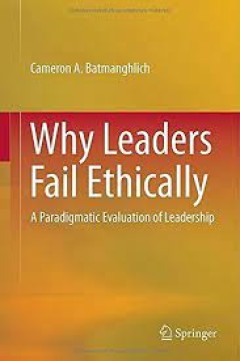Filter by

Why Leaders Fail Ethically A Paradigmatic Evaluation of Leadership
Contrary to popular conceptions that ethical failures in leadership are correlated with economic downturns and other stressful market conditions, this book argues that such transgressions are an intrinsic element of leadership, as it is defined under the current prevailing paradigm. In recent years the crisis of failures in ethical leadership across organizations, particularly corporations, …
- Edition
- -
- ISBN/ISSN
- 978-3-319-12733-0
- Collation
- XII, 144
- Series Title
- -
- Call Number
- -

What If We Don't Die? The Morality of Immortality
This book deals with the very real possibility of earthly immortality and the human and societal implications of such immortality, including whether it is desirable. It looks at what makes immortality appear so attractive and at the possibility that we would be better served with longer lives and the freedom to terminate our lives at the time when life has given us all the joy, inspiration a…
- Edition
- -
- ISBN/ISSN
- 978-3-319-19093-8
- Collation
- VIII, 183
- Series Title
- -
- Call Number
- -

The Meaning of Liberty Beyond Earth
The purpose of this book is to initiate a new discussion on liberty focusing on the infinite realms of space. The discussion of the nature of liberty and what it means for a human to be free has occupied the minds of thinkers since the Enlightenment. However, without exception, every one of these discussions has focused on the character of liberty on the Earth. The emergence of human space expl…
- Edition
- -
- ISBN/ISSN
- 978-3-319-09567-7
- Collation
- VIII, 272
- Series Title
- Space and Society
- Call Number
- -

Medicine and Society, New Perspectives in Continental Philosophy
This volume addresses some of the most prominent questions in contemporary bioethics and philosophy of medicine: ‘liberal’ eugenics, enhancement, the normal and the pathological, the classification of mental illness, the relation between genetics, disease and the political sphere, the experience of illness and disability, and the sense of the subject of bioethical inquiry itself. All of the…
- Edition
- 1
- ISBN/ISSN
- 978-94-017-9869-3
- Collation
- VIII, 323
- Series Title
- Philosophy and Medicine
- Call Number
- -

Family-Oriented Informed Consent East Asian and American Perspectives
This volume addresses the proper character of patient informed consent to medical treatment and clinical research. The goal is critically to explore the current individually oriented approach to informed consent which grew out of the dominant bioethics movement that arose in the United States in the 1970s. In contrast to that individually oriented approach, this volume explores the importance o…
- Edition
- -
- ISBN/ISSN
- 978-3-319-12120-8
- Collation
- XII, 288
- Series Title
- -
- Call Number
- -

Vladimir Solov’ëv's Justification of the Moral Good Moral Philosophy
This new English translation of Solov’ëv’s principal ethical treatise, written in his later years, presents Solov’ëv’s mature views on a host of topics ranging from a critique of individualistic ethical systems to the death penalty, the meaning of war, animal rights, and environmentalism. Written for the educated public rather than for a narrow circle of specialists, Solov’ëv’s w…
- Edition
- -
- ISBN/ISSN
- 978-3-319-12775-0
- Collation
- LXX, 435
- Series Title
- -
- Call Number
- -

Extreme Inequalities in Contemporary Capitalism Should We Be Concerned About…
This book explores the mechanisms by which top incomes are achieved through work in today’s advanced economies and asks to what extent current extreme inequalities are compatible with widely held values of social justice. Reflecting on the heterogeneity of the working rich, the authors argue that very high earnings often result not from heightened competition induced by globalization but rath…
- Edition
- -
- ISBN/ISSN
- 978-3-319-28811-6
- Collation
- 13 b/w illustrations
- Series Title
- -
- Call Number
- -

Neuroenhancement: how mental training and meditation can promote epistemic vi…
This book explores how one can bring about changes in the brain through meditation, both through attention-focus training and through compassion training. Recent findings in the natural sciences have confirmed that it is possible for humans to achieve these structural and functional changes through various life-style practices. It is argued that meditation enables us to influence some aspects o…
- Edition
- 1
- ISBN/ISSN
- 978-3-319-23516-5
- Collation
- XI, 110
- Series Title
- SpringerBriefs in Ethics
- Call Number
- -

Kuhn’s Structure of Scientific Revolutions - 50 Years On
In 1962, the publication of Thomas Kuhn’s Structure ‘revolutionized’ the way one conducts philosophical and historical studies of science. Through the introduction of both memorable and controversial notions, such as paradigms, scientific revolutions, and incommensurability, Kuhn argued against the traditionally accepted notion of scientific change as a progression towards the truth about…
- Edition
- -
- ISBN/ISSN
- 978-3-319-13383-6
- Collation
- -
- Series Title
- -
- Call Number
- -

Migration in the Age of Genocide
This book presents a novel proposal for establishing justice and social harmony in the aftermath of genocide. It argues that justice should be determined by the victims of genocide rather than a detached legal system, since such a form of justice is more consistent with a socially grounded ethics, with a democracy that privileges citizen decision-making, and with human rights. The book cover…
- Edition
- 1
- ISBN/ISSN
- 978-3-319-21848-9
- Collation
- XIV, 216
- Series Title
- Migration, Minorities and Modernity
- Call Number
- -
 Computer Science, Information & General Works
Computer Science, Information & General Works  Philosophy & Psychology
Philosophy & Psychology  Religion
Religion  Social Sciences
Social Sciences  Language
Language  Pure Science
Pure Science  Applied Sciences
Applied Sciences  Art & Recreation
Art & Recreation  Literature
Literature  History & Geography
History & Geography